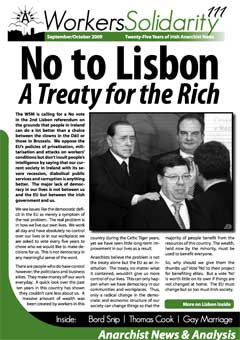Over 30 years of anarchist writing from Ireland listed under hundreds of topics
Lisbon and Democracy - Do We Really Have a Say?
It’s the time of year where we plebs get a chance to rectify our impertinence in rejecting the Lisbon Treaty. In itself, rerunning the referendum is hardly an affront to democracy. After all, people are simply being asked to confirm the decision made.The reason it raises hackles is the sheer obviousness of the government’s bias; if the yes side had won, then there would be no second referendum. After all, there wasn’t any after Maastricht, Amsterdam, or Nice 2.
Put alongside this the fact that the treaty is a warmed over version of the EU constitution rejected by France and Holland – whose leaders haven’t made the mistake of sending Lisbon for ratification by voters this time – and it is hardly a surprise that rerunning the referendum is considered a sleight of the democratic hand.
Democracy, like motherhood and apple pie, is nowadays so universally acclaimed that alongside paeans to human rights, it is invoked by western powers to bomb disobedient third world tyrants.
It wasn’t always like that. For centuries the thought that regular people might have a say in running society filled the ruling elites with a feeling of terror that the mob would run amok and, horror of horrors, do away with the private fortunes enjoyed by Tony O’Reilly, Michael O’Leary and the like.
There was some truth to their fears. Particularly from the time of French revolution, when the domination of aristocrats and the super-rich was increasingly challenged. Many people came to the conclusion that a society which encouraged huge disparities of wealth could not be democratic in practice.
They reasoned that the wealthy would have the time and resources to dominate the cultural life of a country. In the past that included buying political support, subsidizing churches, and gaining control over the press. With these levers, it is relatively easy to build a consensus that the current set up of rich and poor, of citizen and foreigner, is the most natural thing on earth.
Despite the challenge from the labour movement and other progressive forces, the cultural dominance of the powerful has not been eclipsed. Television, radio, and the press remain firmly in the control of a minority. The internet remains an avenue of hope, but it is just as much a vehicle for celebrity trivia as for progressive reform.
Nor is the restricted arena of social and political debate the only barrier to meaningful democracy. People’s chance to participate in making important social decisions is limited to mainly choosing from a set of politicians and to some decisions about one’s personal lifestyle. We are never asked about the overall goals of the organisation we work for and rarely on how it should be organised.
Although the current economic crisis leaves the elites facing a series of choices, say, whether to implement NAMA or nationalise the banks, these decisions are out of our hands. Working people are, however, expected to pick up the tab through increased taxes and cutbacks to public services.
The same applies to any major investment decision taken by a government or corporation. When, for instance, were we asked whether giving away the gas off the western coast for half nothing? And when are the American people ever going to get a chance to vote on continuing their various overseas military occupations?
The upcoming Lisbon vote is one of the rare occasions that the people get a direct say. But only a very limited say. We get to choose between either a gombeen republic or an embryonic European state, neither of which makes for an exciting prospect.
Whichever way the vote goes, there is no indication that either a yes or a no vote will substantially alter the exclusion of the public from major public decisions. That requires a rethinking of the kind of society we want.

This article is from Workers Solidarity 111 September 2009
Download the PDF file of WS111

